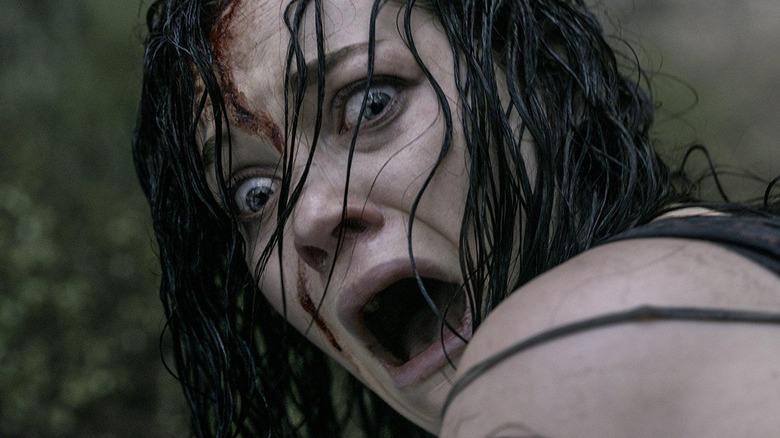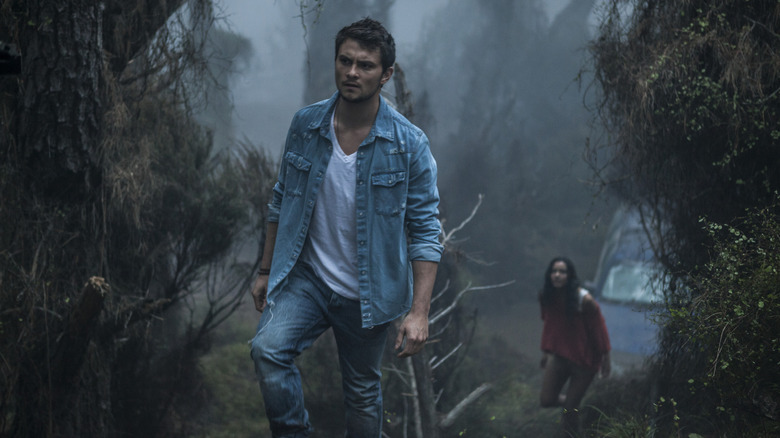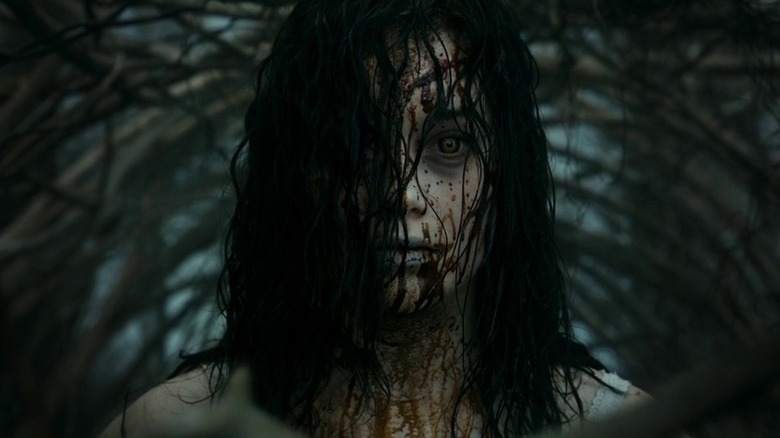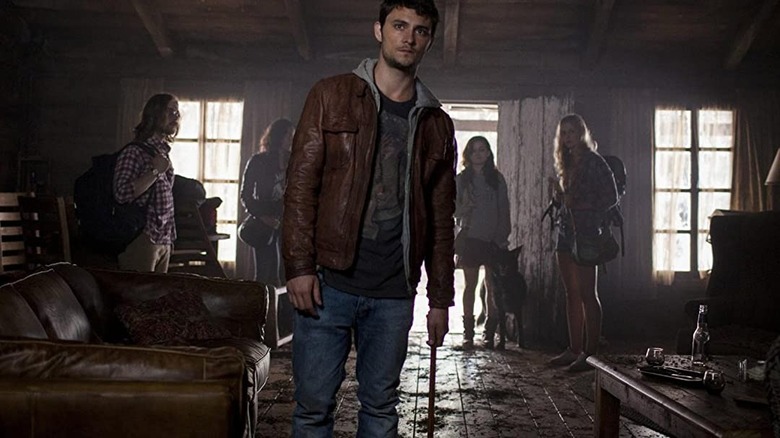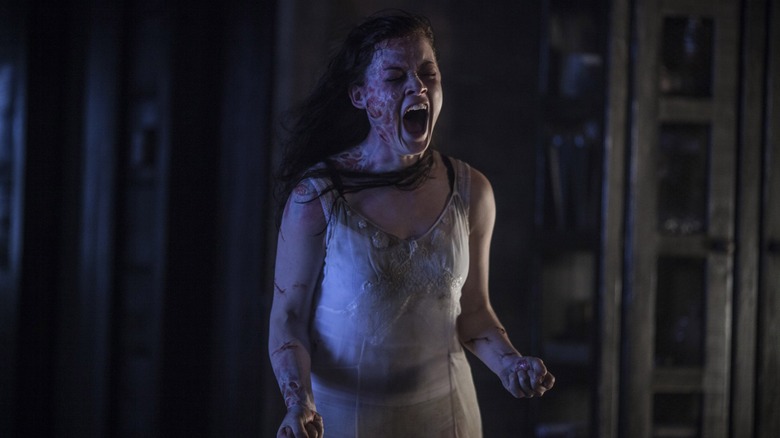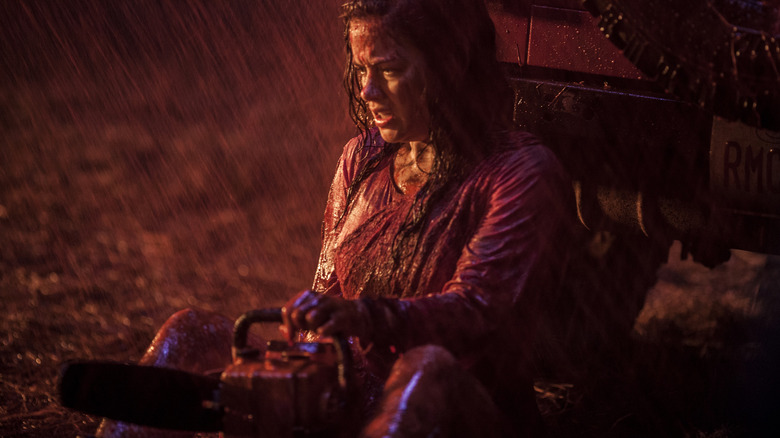Tales From The Box Office: 2013's Evil Dead Gave The B-Movie Horror Franchise Mainstream Success
(Welcome to Tales from the Box Office, our column that examines box office miracles, disasters, and everything in between, as well as what we can learn from them.)
There are certain success stories in the history of cinema that serve to inspire filmmakers for generations to come. Existing right alongside Kevin Smith's low-budget comedy "Clerks" and Robert Rodriguez's "El Mariachi," there is Sam Raimi's all-time horror classic "The Evil Dead," which was made on a shoestring budget with his pals, producer Rob Tapert and star Bruce Campbell, in the early '80s. It ultimately found success despite its lack of resources, having earned more than $29 million in ticket sales to date. Not bad for a movie that was made for a mere $375,000.
Be that as it may, even today, the 1981 film is probably closer to a cult classic than it is a bonafide mainstream hit. Yes, horror fans know it and know it well, but it's simply not on the same level as something like "Halloween" or "Friday the 13th." My grandma knows who Michael Myers is, she has no idea who Ash Williams is. But the franchise would, at long last, make its way into the mainstream in a big way in 2013 when a first-time feature director named Fede Alvarez brought the series back from the dead with his take on "Evil Dead." A brutal and bloody reimagining for a new generation that brought the goods and brought out horror fans en masse.
In honor of the movie's 10th anniversary, we're looking back at 2013's "Evil Dead," how it came to be, whether or not it's actually a remake (it isn't!), how it paved the way for this franchise to finally become a part of the mainstream horror scene, and what lessons we can learn from it a decade later. Let's dig in, shall we?
The movie: Evil Dead (2013)
Raimi, Tapert, and Campbell revisited Ash and the Deadites a couple of times over the years. First in 1987 with "Evil Dead II," which was far more comedic in tone, and once again in 1993 with "Army of Darkness," which took things in a radically different direction and embraced the camp in a sword and sorcery style adventure. But "Army" didn't perform particularly well ($21 million box office/$11 million budget), leaving the series dead in the water for a long, long time. Then, in the early 2000s, talk of a remake began cropping up here and there.
Yet, as late as 2008, things weren't looking particularly great on that front. "The feedback from the fans was 90 percent negative. It's going nowhere. The remake has fizzled fast at Sam's company," Campbell said speaking to Fangoria Radio at the time. However, things changed and, in 2011 during a Reddit AMA, Campbell confirmed that the remake (or what everyone thought was going to be a remake) was actually happening. "We are remaking Evil Dead. The script is awesome," the actor said before adding, "The remake's gonna kick some ass — you have my word."
Raimi hand-picked Fede Alvarez for the job, with only a couple of shorts to the filmmaker's name at the time. Now, he was going to have the chance to bring a highly influential classic to the masses. No pressure. Alvarez wrote the initial draft of the screenplay alongside his friend and frequent collaborator Rodo Sayagues. Though, oddly enough, Diablo Cody of "Juno" fame did a rewrite of the script, mainly because Alvarez and Sayagues didn't speak English as their first language. Ultimately, they were given official credit along with Raimi. "I did a draft. I did like a polish slash rewrite on the pre-existing, excellent script by Fede Alvarez," Cody said to Collider in 2011.
'Let's try to make the scariest movie ever'
The main thing is, whatever credit this movie gets for being good (or not good, depending on your view) largely rests on Alvarez, despite Cody's seemingly minor involvement. As for his pitch? Speaking to Gizmodo in 2012 after the first trailer dropped, the filmmaker explained what he pitched to Raimi. It was rather ambitious.
"Basically what we pitched to [Raimi] was let's try to make the scariest movie ever. Something that is gross, something you feel like you're not supposed to watch, something that is violent, something that will scare the s*** out of you. And that's exactly what Sam wanted to make."
Whether or not that was accomplished? That's another question entirely, but the film is full-stop brutal, bloody, and serious. There is hardly any levity to be found — it's an unrelentingly dark ride. For those who may need a refresher, the film takes place at an isolated cabin in the woods as five young friends are there to help Mia (Jane Levy) break her bad drug habit. While there, they find the Book of the Dead and accidentally release a violent demon. Blood spills from there – lots of it. Amazingly enough, Alvarez says they used no CGI to accomplish the movie's many violent effects.
"We didn't do any CGI in the movie. There's no CGI in the movie. Everything you will see is real, which was really demanding. This was a very long shoot, 70 days of shooting at night. There's a reason people use CGI it's cheaper and faster, I hate that. We researched a lot of magic tricks and illusion tricks. [Like] how you would make someone's arm disappear."
Don't call it a remake
The cast is largely made up of then-unknown actors (relatively speaking), though Lily Collins, coming off of "The Blind Side" of all things, was originally going to play Mia before dropping out of the film. That paved the way for Jane Levy to take her place, ultimately becoming a pretty major fan-favorite. Alvarez and the team pulled precisely zero punches in reimagining this world for modern audiences. So much so that the original cut was given an NC-17 rating by the MPAA, as the filmmaker revealed on Twitter in 2013 ahead of the release.
"Was proud of scoring a NC17 when submitted! But we had to cut stuff out to get an R and get the film into theaters."
The big question that loomed for some time, even after the movie hit theaters, was whether or not "Evil Dead" was a remake or a sequel of some sort. In 2018, again taking to Twitter, Alvarez gave his answer.
"It continues the first one. The coincidences on events between the first film and mine are not coincidences, but more like dark fate created by the evil book. (Ash car is still there rusting away)"
That helps to explain Campbell's very brief cameo in the credits. It also explains the fact that the plan for the sequel that never happened involved bringing Ash and Mia together. "The whole intention was to do that, to team [Ash and Mia] up. That was always the goal," Alvarez explained to Bloody Disgusting in 2020. Call it whatever you want, but all that mattered was whether or not audiences would turn up, and they most definitely did when the time came.
The financial journey
Sony Pictures landed distribution of the film and, to build some much-needed hype, they held a premiere for "Evil Dead" at SXSW in 2013 ahead of the theatrical rollout. That seemed to work quite well, as the buzz was largely positive. The studio opted to release it on April 5, 2013, as the only major new release that weekend — though Universal was also re-releasing "Jurassic Park" that same weekend. Even so, Steven Spielberg's dinosaurs were not an issue, as Alvarez delivered the goods and, with his feature directorial debut, scored a #1 hit.
"Evil Dead" opened with $25.7 million, beating out "G.I. Joe: Retaliation" ($20.8 million) in its second weekend. Or, to put it another way, the film earned more in its opening weekend than "Army of Darkness" did in its entire theatrical run. The only issue is that the film dropped hard in its second frame, falling 63.2% adding $9.48 million to its total. But thanks to its reasonable $17 million budget, it didn't matter. The film finished its run with $54.2 million domestic and $43.3 million internationally for a great $97.5 million global total. Earning just shy of six times one's production budget is always going to be a huge win.
The success helped open the door for more from the franchise on a bigger stage in the years that followed. Campbell would return to the role of Ash in "Ash vs. Evil Dead," which aired on Starz for three seasons beginning in 2015. Remarkably, we never got a sequel to this film, but we are getting director Lee Cronin's "Evil Dead Rise" which will, once again, bring the series back to the big screen. Thanks to this movie, Sam Raimi's classic finally made its way into the mainstream and has largely been there ever since.
The lessons contained within
What's kind of fascinating about 2013's "Evil Dead" a decade removed is how unconcerned it was with nostalgia for what came before. Yes, it takes a lot of familiar beats from Sam Raimi's original classic, but it also very much exists on its own terms with new characters and a genuinely fresh take on the material. They didn't try to shoehorn in Ash or lean too heavily on the past. In that way, it allowed the film to welcome in old fans but, more importantly, served as a jumping-on point for modern moviegoers who may not have ever even heard of or seen the original.
Nostalgia-driven franchise plays have only become more popular in the decade since this movie was released. Just look at Raimi's own "Doctor Strange in the Multiverse of Madness," which utilized cameos from other Marvel films in the multiverse to help generate excitement. Or legacy horror sequels like 2018's "Halloween" that root themselves so directly to the past that it can, at times, be difficult for them to exist entirely on their own terms. Granted, these movies are often very successful, but there are limits to living in the past.
"Evil Dead" was an early example of using a franchise to get a movie made but using it as a vehicle to move on from the past in some ways. Similarly, "Scream VI" got on just fine without Neve Campbell's Sidney Prescott and "Evil Dead Rise" will also be soldiering on without Ash Williams. There's nothing wrong with franchise filmmaking, but there's also nothing wrong with letting these things grow beyond what they once were. Good things can happen.
